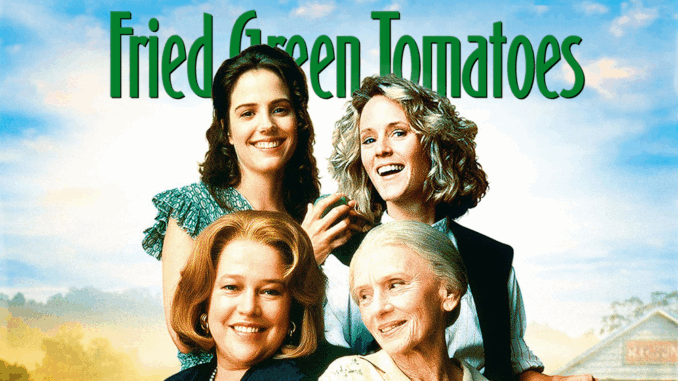
A Film That Grows With You
More than three decades have passed since Fried Green Tomatoes premiered in 1991, but the emotional pulse of the film still beats strongly in 2025. Viewers return to Whistle Stop not just for nostalgia, but for renewal. As life changes and the world feels increasingly uncertain, Fried Green Tomatoes offers a warm, enduring reminder of the power of compassion, resilience, and friendship.
What sets the film apart isn’t just its story—it’s how the story finds you at different points in your life and speaks new truths each time.
Idgie and Ruth: A Love That Transcends Time and Labels
Though the film adapts its 1987 novel source material (Fried Green Tomatoes at the Whistle Stop Cafe by Fannie Flagg), one of the most quietly radical parts remains intact: the deep, emotionally rich bond between Idgie Threadgoode and Ruth Jamison.
In 2025, their relationship is embraced by new generations who see in it a same-sex love story ahead of its time. Without ever labeling their connection, the film makes it clear: love, in all its forms, deserves dignity, space, and storytelling.
Their dynamic challenges conventions. Ruth, gentle yet firm, finds courage. Idgie, wild yet loyal, finds purpose. Together, they build a home not defined by rules but by mutual strength. It’s not just a love story—it’s a liberation.
Evelyn Couch: A Symbol of Midlife Rebirth

When we meet Evelyn, she’s every woman who’s ever felt invisible, stuck, or too far gone to change. But by the film’s end, she’s transformed—finding power in her voice, reclaiming her agency, and embracing the unlikeliest of friendships.
In today’s conversations around mental health, menopause, and feminine identity, Evelyn resonates more than ever. She’s a blueprint for reinvention. And Ninny Threadgoode, with her lilting stories and piercing insights, becomes a gentle catalyst for that change.
Whistle Stop Café: Memory, Magic, and Mystery
For many fans, the Whistle Stop Café isn’t just a film location—it’s a portal. In 2025, fans continue to flock to Juliette, Georgia, where the real-life café operates today. Stepping into the cafe is like stepping into the film’s pages: the smell of fried green tomatoes, the warmth of southern hospitality, and a community frozen in time.
The café isn’t just a place to eat. It’s a sanctuary for fans who come to remember, to mourn, and to celebrate. Guests still ask where Buddy lost his arm. They pose at the railroad tracks. They sit at the booth where Ruth once smiled softly across the table at Idgie.
A Story of Survival—Then and Now
Set against the backdrop of the Great Depression and interwar America, Fried Green Tomatoes echoes themes of poverty, racial injustice, domestic violence, and the fear of being different. These aren’t issues of the past—they’re still with us.
Characters like Sipsey, the Black housekeeper who becomes a hero, and Big George, whose dignity in the face of racism is unforgettable, bring humanity to every frame. Their presence reminds viewers that injustice isn’t always loud—but resistance can be quiet and profound.
In 2025, as social movements and reckoning continue across the world, the film feels like a love letter to every marginalized voice that demanded to be heard.
Timeless Wisdom, Endless Comfort
There are films you watch once and forget. Fried Green Tomatoes is not one of them.
It lingers in your chest like a secret passed down through generations. It reminds you that you’re never too old to start over. That found families can heal what bloodlines sometimes can’t. That stories have the power to resurrect forgotten parts of yourself.
From the famous lines—“Face it, girls, I’m older and I have more insurance”—to the closing revelation about Ninny’s identity, the film is layered with meaning. Each time you return, it offers something new.
Final Thoughts: Why You’ll Keep Coming Back
In 2025, Fried Green Tomatoes isn’t just surviving—it’s thriving. Its audience is broader than ever: queer youth finding a safe space in Idgie and Ruth, older women seeing their worth in Evelyn, and families learning about love that defies convention.
So why does the film still heal hearts?
Because it doesn’t just tell a story—it shares a truth. That we are all a little broken. That love and friendship can put us back together. And that even when someone is gone, their stories, their food, and their spirit live on.
That’s the magic of Whistle Stop. And why we keep going back.
